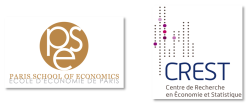 The Paris School of Economics (PSE) and the Centre de Recherche en Économie et Statistique (CREST) have joined forces to develop the Institut des politiques publiques (IPP). The aim of the IPP, founded in September 2011 in the context of the Labex OSE (Ouvrir la science economique), sponsored by the PSE, is to promote quantitative analysis and evaluation of public policies.
The Paris School of Economics (PSE) and the Centre de Recherche en Économie et Statistique (CREST) have joined forces to develop the Institut des politiques publiques (IPP). The aim of the IPP, founded in September 2011 in the context of the Labex OSE (Ouvrir la science economique), sponsored by the PSE, is to promote quantitative analysis and evaluation of public policies.
On April 2, at 2.30 pm (Paris XIV), the PSE and the CREST will be pleased to introduce to you the IPP, and present the findings of its first study, entitled
>> Download this press release in french
Overview of the Institut des politiques publiques
The IPP has three main objectives: to develop academic research by preparing and publishing scientific articles, running long-term projects, and developing the TAXIPP microsimulation model and its data sets; carrying out studies and evaluations on behalf of private and public institutions; diffusing as widely as possible the knowledge acquired, by publishing policy briefs and study reports, and also by making available interactive tools and original data. The IPP is composed of a permanent team and some forty affiliated researchers, mainly from the CREST and the PSE.
TOPICE AND METHODS – IPP researchers work on a wide range of topics related to public policy: tax systems, social policies, employment, education, health, pensions, housing, land-use planning and sectoral policies. The most recent methods in economics research are represented, and the capacity to mobilise any of these methods according to the data available and to the policy under study is at the heart of the IPP’s expertise. Among the favoured methods are microsimulations of the tax and benefits systems, whereas impact studies rely on “natural” or randomized controlled trials, cost-benefit analysis or experimental economics.
SCIENTIFIC INDEPENDENCE AND NON-PARTISAN APPROACH – Public policies pursue a number of objectives, defined by citizens via the political system. The evaluations of public policies carried out by the IPP pay heed to the diversity of these objectives, in a non-partisan way, with complete intellectual independence. To ensure such independence, all the results of the IPP’s research done on behalf of private or public institutions are made public.
SCIENTIFIC COLLABORATIONS
- J-PAL Europe. The Poverty Action Lab (J-PAL), created in 2003 in the MIT by Abhijit Banerjee, Esther Duflo and Sendhil Mullainathan, bases its reputation on the exclusive use of randomized controlled trials for measuring the effects of the social and anti-poverty programmes. J-PAL Europe, based at the Paris School of Economics, gathers European researchers working on various projects to evaluate public policy in France, Europe and other parts of the world. J-PAL Europe is the IPP’s chief partner for randomized controlled trials.
- Cepremap. The Institut des politiques publiques joins with the Cepremap, partner to the Labex OSE, in the context of projects involving public administration, in order to promote the diffusion of its work.
- Banque de France. The IPP has been collaborating with the Banque de France on the assessment of public policies regarding firms, and especially their tax systems.
Ce message est également disponible en :  French
French


